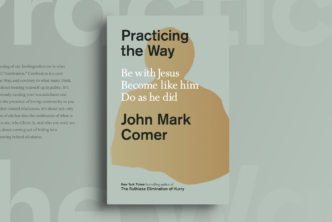Family discipleship is hard work. The days are long with small children: a messy home, a litany of whys, and a gaggle of shouts of joy and frustration over the big and the small. In the midst of all this, you might ask yourself: Am I up for fighting to get them to sit still and listen to ancient words from the Bible? Do I even want to do this?
But it’s also straightforward work. Because the results aren’t up to us!
Jesus compares God’s Word to a seed (Mark 4:26–29). It’s buried in the ground and it grows, matures, and bears fruit—we know not how! It is our work to plant and water, but “God alone gives the growth” (1 Cor 3:7).
In family discipleship, we regularly sow God’s Word into our children’s hearts and into our own. It doesn’t take long to drop a seed in the soil, nor does it take long to read, pray, and sing God’s Word. In his grace, God takes our planting and watering and produces a harvest full of the fruits of his word—a harvest of faith and forgiveness and life everlasting.
Here are five tools I use in my own house to disciple myself, my wife, and my children (five and six years old) and to plant God’s Word in the soil of our hearts.
1. Read God’s Word with your children
“Faith comes through hearing” (Rom 10:17). Set aside time to regularly read God’s Word with your children. In our household, we do this daily, and it really doesn’t take very long. You just have to defend the time. Make it part of your family schedule, like breakfast, lunch, and dinner.
We spend five to ten minutes first thing in the morning with a psalm and some prayers. After dinner, we spend fifteen to twenty minutes with a psalm, a Bible story, and prayers. And at night before bed, we read one psalm. This might seem like a lot, but we slowly built up to this piece by piece. We started with something small—just a psalm—and built from there. And you can do this too!

2. Sing God’s Word with your children
Singing helps us remember, and children love music! It’s a beautiful and useful thing to sing the very Word of God with your children. You’re sowing verses into their lives, so that God’s Word is at the tip of their tongue.
In our house, we sing as part of our normal routine of Bible reading and prayer. For those of you (like me!) who can sing okay but can’t read music, there are good resources to help you learn tunes. Dana Dirksen has set many verses to music in her album, Songs for Saplings; so too has Rain for Roots.
I’ve used this helpful song library from the Lutheran Church—Missouri Synod to sing the verses that we sing in our household. Here are some of the verses we sing:
- For beginning prayer, Psalm 51:15 and Psalm 70:1: “O Lord, open my lips, and my mouth will declare your praise”; “Make haste, O God, to deliver me. Make haste to help me, O LORD.”
- For responding to the Bible reading, Psalm 119:89 and Psalm 26:8: “Your word is firmly set in the heavens”; “Lord, I love the habitation of your house and the place where your glory dwells.”
- For ending prayer, 2 Corinthians 13:14: “The grace of our Lord Jesus Christ and the love of God and the communion of the Holy Spirit be with you all.”
- For bedtime, Simeon’s song (also called by its opening words in Latin, the Nunc Dimittis; Luke 2:29–32): “Lord, now you let your servant go in peace. Your word has been fulfilled. My own eyes have seen the salvation, which you have prepared in the sight of every people. A light to reveal to the nations and the glory of your people Israel.”
I like to drop out a word or phrase from these songs as we sing. My children know that I’m challenging them to sing the missing word or phrase without me. It keeps things light and fun, while also keeping them engaged.
3. Recite God’s Word with your children
Children learn language by memorization. They memorize words and phrases, learning their meaning by hearing how they’re used and by using them. Classical pedagogy understood this. The approach was:
- Step 1: memorize the words
- Step 2: memorize their meaning
- Step 3: restate their meaning in new words
You’ll find this same approach in the church’s tradition of catechesis—for example, see the preface to the Small Catechism by the sixteenth-century pastor and reformer, Martin Luther.
We don’t graduate from one step to the next, but we must always continue in each step. And so you should recite Bible passages, the Ten Commandments, the Apostles’ Creed, and the Lord’s Prayer with your children! You too are still learning the depth of the Word that interprets your life.
I also drop out a word or phrase from a line of the Lord’s Prayer or the Apostles’ Creed as we recite. My children like to shout the missing word or phrase louder and louder.

Caption: You can teach your kids about what the Lord’s Prayer means with resources like this incredible FatCat book from Lexham Press.
4. Pray God’s Word with your children
Prayer is a hard concept. It’s not like conversation where we can see the person we’re talking to or hear their voice. It’s not like correspondence where we’ll receive a text or an email or a letter. And yet children want to pray. They are so open about what they’re thankful for or what they’re disappointed about. But in my own experience, I’ve found that if I ask, “What do you want to pray for?” children don’t respond. They’ll clam up. I’ve found that if I ask different questions, children will gush out responses. For example, “What would you like to say ‘I thank you, God’ for?” or, “What would you like to say ‘I ask you, God’ for?” or “I’m happy, God” or “I’m sad, God.”
I tend to repeat what my children are giving thanks for or asking for. No matter what it is—I want them to know that God is their heavenly Father and he wants to hear their concerns and joys and worries. Nothing is too small or too silly to share. And so sometimes I find myself saying, “We thank you God for these fun toys, and we thank you God for Jesus!” No part of our lives are partitioned off from God.
5. Set a routine of God’s Word with your children
Children love routine! They watch the same movies, read the same books, play the same songs—again and again and again. We also structure their days to make our lives as parents easier. For example, we have a bedtime routine. Each night we go through the same tasks in the same order: brushing teeth, using the toilet, reading stories, and going to bed. Just think what would happen if every night those tasks were jumbled!
Children thrive on routine. It helps them know what to expect and it helps give them power.
And yet there can be resistance to creating routine around matters of faith, as if routine is boring or rote or dead. This says more about parents and our culture than it says about good and faithful pedagogy. School and sports have routine! Why shouldn’t church?!
Routine will reinforce the other four discipleship tools. Look for ways to build routine habits of prayer and Bible reading into your life and your children’s life—into your life together. Just like any other routine, some days will go better than others (if your family is like mine!). And that’s okay. Each day is a chance to start anew. After all, God’s Word and prayer make all things holy (1 Tim 4:5).

More resources for discipleship
The King of Easter: Jesus Searches for All God’s Children (A FatCat Book)
Regular price: $12.99
The King of Christmas: All God’s Children Search for Jesus (A FatCat Book)
Regular price: $12.99





